The Catholic Bishops Conference of the Philippines (CBCP) declared 2018 as the Year of the Clergy and Consecrated Persons. CBCP head Archbishop Romulo Valles envisions the priests and consecrated persons to become “renewed” servant-leaders “who care most especially for the least, the lost, and the last.” The year will also be spent for the promotion and recognition of the priestly and religious vocations.
A Catholic priest can have as low as 2,000 parishioners to take care of to as many as 8,000 souls to look after. That these 2,000 lay members of the Church who have witnessed the good example of their priest would later bring up families of their own following good faith and morals, then a priest’s good influence multiplies. But so does the opposite. Thus, the need to pray more for the fidelity of these priests who witness closely to Christ here on earth.
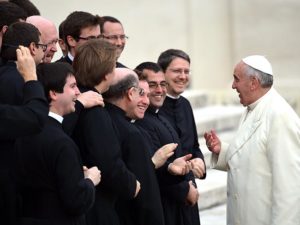
In support of the Year of the Clergy and Consecrated Persons and in celebration of the Golden Jubilee of UA&P, we got in touch with six men of the cloth—ministerial priests—who passed through the Dragons’ lair.
Know the stories of these five UA&P Dragons bound by one vocation.
Fr. Derrick T. Barria
AB Humanities with Specialization in Political Economy, 1993
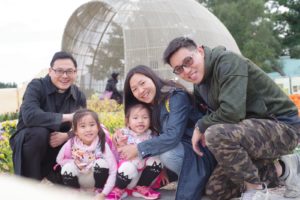
“One does not choose to be a priest,” Father Derrick, the youngest among three boys in the family, said. “One merely responds to God’s call to be one.”
Fr. D, as the Macau-based priest is fondly called, admitted that the priesthood was on his list of I-wanna-be’s when he was young, but so was becoming a farmer, a fireman, a policeman, a doctor, a politician, and an urban planner. It was his years in high school—replete with vivid memories of his “federation” of friends at Xavier School—that influenced him the most, however, and nudged him to his eventual vocation to Opus Dei.
“To some extent, one already finds in high school all the elements of what this world is about,” the self-confessed “expert eater” said. “You see how we respond to the invitation to do good and the will to resist evil. It is the years when you determine where and in what way God fits in your life. You could say that this is the age when you make your first life decision that sets the course of how your life turns out to be. I mean that in the context of all the hoopla of activities: studies, exams, gossiping on teachers and other classmates, hanging out with friends on weekends, visiting each other’s homes, eating from each other’s lunchboxes in school cafeteria, playing basketball and tennis, and swimming.”
His years in UA&P, however, afforded him the opportunities to come out of his shell and receive the formation he needed. His coming to UA&P (then Center for Research and Communication) at a time when student organizations were only a handful and systems were not yet in place spurred him and his batch to confront the issues and fix them.
“We were gifted with the privilege of suffering those problems and hearing, discussing, suggesting, testing, refining, etc. the future solutions. That experience is not meant to remain with the pioneering years. That pioneering spirit is and should always be at the foundation of the UA&P spirit.”
The drama that came with Fr. D’s call to holiness played out with UA&P as the backdrop. He moved out of the family home before college graduation to live in a center of Opus Dei. His family met this with a heavy heart, but their deep respect for one’s personal freedom paved the way for acceptance.
“You know things are okay when they start complaining about others,” he teased.
He turned chicken, however, when he had to inform his parents of his decision to join the priesthood. Calling from Rome, where he did his ecclesiastical studies, he asked his mother, Nenita, to inform his dad, Mario, but the now 81-year-old grandfather to two said, “Whatever it is you want to say, you better say it to me face to face!” Fr. D flew home, with the full support of the late Bishop Javier Echevarría, then prelate of Opus Dei.
“Quite funnily, in those few days, I never even brought up the matter to him [his father],” the third-generation Catholic from a Chinese family narrated. “We went about visiting places, running errands, etc., but in the end, I just flew back without ever mentioning the ordination. The gesture of making the trip made up for words not spoken. Many things in life I suppose are like that – words that are left unspoken for the gesture more than makes up for the words.”
That silent language of love continues. Up to now, his father’s way of showing him affection is to buy him shoes.
Fr. Dante P. Estepa, Jr.
Master of Science in Industrial Economics, 2009
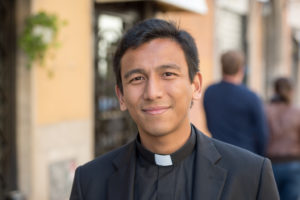
On the day he was about to enroll in a university in Iloilo, the boy whom everyone called Dan received news from the Admissions Office of UA&P that he was eligible for a full merit scholarship. “Wonderful!” the youngest of four siblings thought. The catch was that there were no engineering courses yet in UA&P, and he wanted to become an engineer just like his father. But he remembered how his parents, who both went to universities away from their families, would talk about their college days with a lot of joy.
“I think that this, in part, affected me even as a child because since then I wanted to go through the same adventures: knowing how to be independent, knowing how to be out of one’s comfort zone, knowing that even if sacrifices are involved, it will be worthwhile, ” he said.
In the end, he who used to join taekwondo competitions in grade school opted to try his luck in this university in Pasig City. Little did he know that this decision would—13 years later—lead everyone to calling him Father Dan. He celebrated his first year of priesthood just this April 29.
It was in UA&P, when he was about to start his sophomore year, that God knocked on his door to call him to Opus Dei. He joined, wanting to sanctify his ordinary work as a student and later as faculty member of the UA&P School of Economics. After some time, God knocked on his door once more to call him to the priesthood. His discernment took years, but when he said yes, everything fell into place.
“At first, there was apprehension,” he recalled his parents’ reaction when he informed them about his decision to become a priest. “That was normal. Probably they thought that my decision to give my whole life to God was a matter of momentary enthusiasm. They had their own plans for me, but when they realized that God was really calling me to the priesthood, they gave way and supported me all the way.”
In college, he liked Calculus and math-related subjects. More than this, however, he appreciated the holistic education that the University offered him. “I realized that life is not only about getting a stable job and having a successful career,” the former faculty member of the UA&P School of Economics said. “There are also other worthwhile endeavors in this life, such as service to others.”
This now translates to the challenge every priest face: bringing Christ into the lives of the men and women of today. “Things have changed, and maybe there’s a tendency to think that the message of the Gospel is a thing of the past,” the Rome-based priest said. “But the message of the Gospel is always new. It continues to be a force that can guide the life of the contemporary man. Now how to make people realize this is the challenge because we priests have to communicate this truth in a manner that the youth of today will understand.”
To the students, faculty, and staff of the University, he gave this message: “Dream for yourself, for the others, and for the University. Despite its 50 years, UA&P is relatively a very young university. It’s a small university growing in prestige, and I’m sure that it will continue to grow if we all know how to dream for the University.”
Fr. Dean Johnpaul D. Menchavez
Master of Science in Industrial Economics, 2003
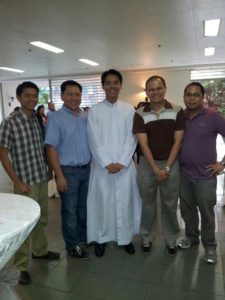
After college, Dean Johnpaul became a management trainee in a bank, an executive assistant, an economics teacher, and a research analyst. He wanted to become a lawyer or a businessman, but God had other plans for this middle child.
The towering figure of Fr. Jp—who finds delight in basketball, darts, and billiards—is made more manifest now that he mingles with grade school and high school students in a private school in Alabang, Muntinlupa City. He hears the confession of the students and gives spiritual formation activities to the parents, teachers, and staff as well.
Fr. Jesus Carlo L. Merino
AB Humanities with Professional Certificate in Humanities, 2006
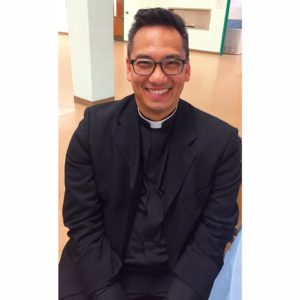
As a young boy, he used to play video games a lot, but then in elementary, his interest moved to piano and the theater arts. And music became his life.
Fr. JC majored in piano performance in high school, but his theater and dancing skills took him to Europe. Prior to entering the seminary, he became music apprentice and assistant to Filipino musician, composer, and conductor Ryan Cayabyab at the San Miguel Foundation for the Performing Arts.
“I was happy as a musician,” the only child said, “but there was something that was always lacking. It was like God was calling me to do something else and that I would not be happy if I did not look for that something and find out what it was.”
His spiritual director broached the subject of priesthood, which he dismissed initially because he did not want another rejection. Years ago, he tried to enter the Jesuit Order but he was turned down because he was “too young.”
“I thought that God was calling me to be a Jesuit for the simple reason that the Jesuits in the Philippines are very much associated with good liturgical music—and I love good music in our worship,” said Fr. JC, whose favorite subject in UA&P was theology.
Nonetheless, he heeded God’s call. At present, he lives in New Jersey and tends to the parishioners of the Church of the Presentation at Upper Saddle River. A typical day involves funerals in the morning, writing of homilies, and praying with the sick, the homebound, and the grieving.
“I feel that as a priest, there is a special grace that God bestows on us, that is, the grace that we have to be a part of each one’s life story, to be a part of each one’s family, without being possessed by just one. Also, the grace that we have to be the presence of Christ—the face of the mercy and love of God—in the most intimate lives of the people.”
The life that he now lives did not surprise his parents. “They said they knew that I was going to be a priest,” Fr. JC narrated, “because it was ‘a pact’ they made with God, when they asked and prayed to conceive a child.” He considered his family’s stay in Brunei, where his father retired as a bowling manager, the happiest years of his childhood.
“My mother told me that her dream is that one day the whole world might smile at me,” the music lover said. If that day has not happened yet, his mother’s smile from heaven would suffice.
Fr. Mark Emman H. Sese
Master of Science in Industrial Economics, 2003
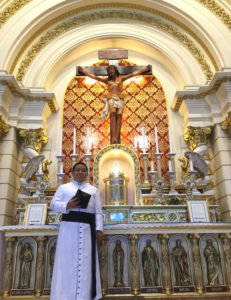
He first received the call to priesthood during a thanksgiving mass in elementary when he was 12 years old. He attempted to enter the seminary when he was 13 and again when he was 17. In both attempts, his father discouraged him, saying that he was not yet ready to make decisions in life. “He allowed me to enter the seminary after I finished my studies in UA&P,” he who harbored the dream to become a lawyer just like his father said.
Fr. Mark, whose family hailed from Masbate, felt closest to his parents. He was amused when his mother told him when he was already ordained that she had been praying for his priestly vocation ever since he was five or six years old. And even if his father was initially against the path he wanted to take, he understood his father’s misgivings. “He just wanted to make sure that I am happy with my decision. In the end, he agreed and supported me.”
A typical day for him at the Our Lady of the Poor Parish in Western Bicutan, Taguig City begins at 5:00 am and ends at 10:00 pm. Though he loves doing all the pastoral and office work that comes with being a parish priest, it is the celebration of the Mass that he treasures the most. “It is the renewal of the sacrifice of our Lord in Calvary, and I am in Calvary every time I celebrate the Mass,” said he whose younger brother is a lawyer (and an IT graduate of UA&P) and whose younger sister is a sophomore in the University.
Himself a UA&P alumnus, he remembered a class in World History. The professor started the semester without introducing his name; rather, he wrote a phrase in the board that said, “There is no greater lie than the truth misunderstood.”
He wishes the University well and encourages the academic community to look at the past, the present, and the future in the context of “Pasasalamat sa Nakaraan, Pagdiriwang sa Kasalukuyan, Pangarap sa Hinaharap,”echoing the theme of Our Lady of the Poor’s 25th anniversary on December 29 this year.#
Leave a Reply